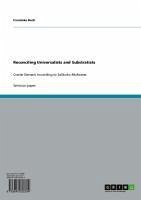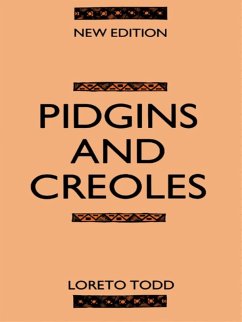
Reconciling Universalists and Substratists (eBook, ePUB)
Creole Genesis According to Salikoko Mufwene
Sofort per Download lieferbar
Statt: 17,95 €**
15,99 €
inkl. MwSt. und vom Verlag festgesetzt.
**Preis der gedruckten Ausgabe (Broschiertes Buch)
Alle Infos zum eBook verschenkenWeitere Ausgaben:

PAYBACK Punkte
0 °P sammeln!
By way of an introduction to the following paper, I would like to draw here on a quote taken from one of Salikoko Mufwene's essays: "...creolists generally agree on the nature of the sociohistorical contexts which have produced these languages, but they disagree essentially on the natures of the linguistic processes which resulted in them." (1986:129). This sentence quite neatly captures what the general pidgin/creole-debate is all about. The various approaches to pidginization and creolization and on how, i.e. by which underlying processes, the respective language systems supposedly came into...
By way of an introduction to the following paper, I would like to draw here on a quote taken from one of Salikoko Mufwene's essays: "...creolists generally agree on the nature of the sociohistorical contexts which have produced these languages, but they disagree essentially on the natures of the linguistic processes which resulted in them." (1986:129). This sentence quite neatly captures what the general pidgin/creole-debate is all about. The various approaches to pidginization and creolization and on how, i.e. by which underlying processes, the respective language systems supposedly came into being have this one thing in common: they all entail, respectively proceed from the assumption in the first place, that they have something decisive to say about the nature of language in general. Therefore the different positions are often defended most decidedly, trying, or so it seems, to lay claim to a final definition of language in one or the other light. As such, I like to describe this phenomenon as some kind of linguistic-philosophical debate. And this is what the subject of the following paper shall be about: What are the various approaches, how convincing are they, i.e., who has the best arguments or is able to disprove opposing views best? In this sense, the following will be a theoretical rather than practical, case-study paper. The discussion can be roughly described in terms of two major opposing viewpoints: the universalist one and a more cognitive-oriented, functional-pragmatic. The latter is called substratist for the most. The two camps tend to put either more weight on the structural or the sociohistorical aspect respectively. It is especially the nativization phase, known as creolization, which interests me most in this paper. [...]
Dieser Download kann aus rechtlichen Gründen nur mit Rechnungsadresse in A, B, BG, CY, CZ, D, DK, EW, E, FIN, F, GR, HR, H, IRL, I, LT, L, LR, M, NL, PL, P, R, S, SLO, SK ausgeliefert werden.













